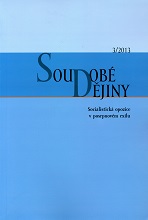Mezi exilem, domácí opozicí a mezinárodním veřejným míněním. Exilový časopis Listy
Between Exile, the Opposition at Home, and International Public Opinion: The Exile Periodical Listy
Author(s): Francesco CaccamoSubject(s): History
Published by: AV ČR - Akademie věd České republiky - Ústav pro soudobé dějiny
Summary/Abstract: This article was originally published as ‘Listy: Tra emigrazione, contestazione interna e opinione pubblica internazionale’ in the Italian online magazine eSamizdat: Rivista di culture dei paesi slavi (2010–11, pp. 281–301). This double issue is a volume of papers from the conference ‘Samizdat between Memory and Utopia: Independent Culture in Czechoslovakia and the Soviet Union in the Second Half of the Twentieth Century’, held at Padua University in late May and early June 2011. It is freely accessible on the website (http://www.esamizdat.it/rivista/2010-2011/index.htm). In this article, the author considers the exile periodical Listy, a bimonthly of the Czechoslovak socialist opposition in Rome from 1971 to 1989. He focuses on the political projects conceived by a group of exiles who left Czechoslovakia after the Soviet occupation in August 1968 and came together to work on this journal, and he looks closely at their relations with the opposition at home in Czechoslovakia. He provides a sketch of Jiří Pelikán (1923–1999), the former head of Czechoslovak Television and a proponent of the reforms of the Prague Spring, who became the founder and guiding spirit of Listy throughout its existence. As a member of the Italian Socialist Party, Pelikán was elected to the European Parliament in 1979. The author describes the circumstances in which the journal was established, outlines its main ideas, describes organizational matters, and also touches upon the financing of the journal and its relation to the democrats who found themselves in exile after the Communist takeover in Czechoslovakia in February 1948. The people who started up the periodical intended it mainly as a means to inform the public around the world about events, people, and ideas in Czechoslovakia, to develop contacts with streams of like-minded people and leading left-wing figures in the West, and to foster ideas coming out of Reform Communism and democratic socialism in the spirit of the Prague Spring. In that sense, Listy, according to the author, preserved a remarkable plurality of opinion. The author also traces the impact that the establishment of Charter 77, the appearance of Solidarity in Poland, and, later, Gorbachev’s perestroika had on the Listy circle. Listy assumed the task of publishing Charter ‘Documents’ and presenting debates that were taking place amongst dissidents. The Listy group also sought similarities between Polish events and the events of the Prague Spring and it linked Soviet reforms with the hope for the rebirth of socialism. In keeping with that, it saw the prospects for change in Czechoslovakia in gradual peaceful reform, while tending to fear mass protest.
Journal: Soudobé Dějiny
- Issue Year: XX/2013
- Issue No: 03
- Page Range: 345-378
- Page Count: 34
- Language: Czech

